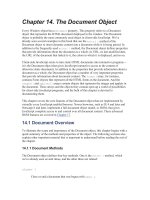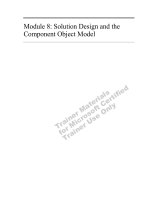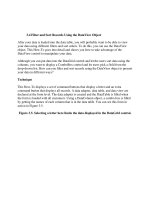The Common Object Request Broker Architecture (CORBA)
Bạn đang xem bản rút gọn của tài liệu. Xem và tải ngay bản đầy đủ của tài liệu tại đây (469.13 KB, 70 trang )
The Common Object Request
Broker Architecture (CORBA)
09/18/19
1
CORBA
Defines a framework for object-oriented
distributed applications.
Allows
distributed programs in different
languages and different platforms to interact as
though they were in a single programming
language on one computer.
Brings advantages of OO to distributed systems.
Allows you design a distributed application as a
set of cooperating objects and to reuse existing
objects.
09/18/19
2
The Basic Architecture
n a m in g
lo o k u p
n a m in g s e r v ic e
o b je c t c lie n t
o b je c t
im p le m e n ta tio n
stu b
s k e le t o n
O R B
O R B
n e tw o rk
n e tw o rk
o p e r a t in g
sy ste m
o p e r a tin g
sy ste m
lo g ic a l d a ta flo w
p h y s ic a l d a t a f lo w
09/18/19
3
Object Request Broker (ORB)
A software component that mediates transfer of
messages from a program to an object located on
a remote host.
Hides underlying network communications from a
programmer.
ORB allows you to create software objects whose
member functions can be invoked by client
programs located anywhere.
A server program contains instances of CORBA
objects.
09/18/19
4
Object Request Broker (ORB)
1) When a client invokes a member function on a
CORBA object, the ORB intercepts the function
call.
2) ORB directs the function call across the network
to the target object.
3) The ORB then collects the results from the
function call returns these to the function call.
09/18/19
5
Implementation Detail
09/18/19
6
Cross-language CORBA application
o b je c t c lie n t w r it t e n in J a v a
s tu b in J a va g e n e ra te d b y co m p ilin g
th e C O R B A o b je c t in te r fa c e
O R B w r itte n in J a v a
09/18/19
o b je c t im p le m e n t a t io n w r it t e n
in C + +
s k e le to n in
C + + g e n e ra te d b y
co m p ilin g th e C O R B A o b je ct
in te rfa ce
O R B w r it t e n in C + +
7
CORBA: A “Software Bus”
09/18/19
8
CORBA Object Interface
A distributed object is defined using a software file similar to the
remote interface file in Java RMI.
Since CORBA is language independent, the interface is defined
using a universal language with a distinct syntax, known as the
CORBA Interface Definition Language (IDL).
The syntax of CORBA IDL is similar to Java and C++.
However, object defined in a CORBA IDL file can be
implemented in a large number of diverse programming
languages, including C, C++, Java, COBOL, Smalltalk, Ada,
Lisp, Python, and IDLScript.
For each of these languages, OMG has a standardized mapping
from CORBA IDL to the programming language, so that a
compiler can be used to process a CORBA interface to generate
the proxy files needed to interface with an object implementation
or an object client written in any of the CORBA-compatible
languages.
09/18/19
9
CORBA Application
Diagram
An ORB compatible with the IOR protocol will allow an
object reference to be registered with and retrieved from
any IOR-compliant directory service.
CORBA object references represented in this protocol are
called Interoperable Object References (IORs).
09/18/19
10
Interoperable Object Reference (IOR)
An IOR is a string that contains encoding for
the following information:
The type of the object.
The host where the object can be found.
The port number of the server for that object.
An object key, a string of bytes identifying the
object.
The object key is used by an object server to
locate the object.
09/18/19
11
Interoperable Object Reference (IOR)
The following is an example of the string
representation of an IOR [5]:
IOR:000000000000000d49444c3a677269643a312e3000000
00000000001000000000000004c0001000000000015756c74
72612e6475626c696e2e696f6e612e6965000009630000002
83a5c756c7472612e6475626c696e2e696f6e612e69653a67
7269643a303a3a49523a67726964003a
The representation consists of the
character prefix “IOR:” followed by a
series of hexadecimal numeric characters,
each character representing 4 bits of
binary data in the IOR.
09/18/19
12
Object Servers and Object Clients
As in Java RMI, a CORBA distributed object is
exported by an object server, similar to the object
server in RMI.
An object client retrieves a reference to a
distributed object from a naming or directory
service, to be described, and invokes the methods
of the distributed object.
09/18/19
13
CORBA Object References
As in Java RMI, a CORBA distributed object is
located using an object reference. Since CORBA
is language-independent, a CORBA object
reference is an abstract entity mapped to a
language-specific object reference by an ORB, in a
representation chosen by the developer of the
ORB.
09/18/19
14
CORBA Naming Service
CORBA specifies a generic directory service.
The Naming Service serves as a directory for
CORBA objects, and, as such, is platform
independent
and
programming
language
independent.
The Naming Service permits ORB-based clients
to obtain references to objects they wish to use. It
allows names to be associated with object
references. Clients may query a naming service
using a predetermined name to obtain the
associated object reference.
09/18/19
15
CORBA Naming Service
To export a distributed object, a CORBA object
server contacts a Naming Service to bind a symbolic
name to the object. The Naming Service maintains a
database of names and the objects associated with
them.
To obtain a reference to the object, an object client
requests the Naming Service to look up the object
associated with the name .
The API for the Naming Service is specified in
interfaces defined in IDL, and includes methods that
allow servers to bind names to objects and clients to
resolve those names.
09/18/19
16
CORBA Naming Service
n a m in g c o n t e x t 1
n a m in g c o n te x t1
...
...
n a m in g c o n t e x t 1
o b je c t
nam e1
09/18/19
...
...
n a m in g c o n te x t2
n a m in g c o n te x t1
o b je c t
nam en
17
A Naming Context
A naming context correspond to a folder or directory
in a file hierarchy, while object names corresponds to
a file.
The full name of an object, including all the
associated naming contexts, is known as a compound
name. The first component of a compound name
gives the name of a naming context, in which the
second component is accessed. This process
continues until the last component of the compound
name has been reached.
Naming contexts and name bindings are created using
methods provided in the Naming Service interface.
09/18/19
18
A CORBA object name
The syntax for an object name is as follows:
<naming context > …<naming context><object name>
where the sequence of naming contexts
leads to the object name.
09/18/19
19
Example of a naming hierarchy
As shown, an object representing the men’s
clothing
department
is
named
store.clothing.men, where store and clothing
are naming contexts, and men is an object
name.
s to re
c lo t h in g
A p p lia n c e s
...
...
w om en
09/18/19
m en
t e le v is io n
20
Object Adapters
In the basic architecture of CORBA, the
implementation of a distributed object interfaces with
the skeleton to interact with the stub on the object
client side. As the architecture evolved, a software
component in addition to the skeleton was needed on
the server side: an object adapter.
d is t r ib u t e d o b je c t
im p le m e n ta tio n
o b je c t a d a p t e r
O RB
09/18/19
22
Object Adapter
An object adapter simplifies the responsibilities
of an ORB by assisting an ORB in delivering a
client request to an object implementation.
When an ORB receives a client’s request, it
locates the object adapter associated with the
object and forwards the request to the adapter.
The
adapter interacts with the object
implementation’s skeleton, which performs data
marshalling and invoke the appropriate method
in the object.
09/18/19
23
The Portable Object Adapter
There are different types of CORBA object
adapters.
The Portable Object Adapter, or POA, is a
particular type of object adapter that is defined
by the CORBA specification. An object
adapter that is a POA allows an object
implementation to function with different
ORBs, hence the word portable.
09/18/19
24
CORBA Flow
Client Virtual Machine
Server Virtual Machine
Client
Remote
Object
Skeleton
Stub
“Fred”
Name
Server
Virtual
Machine
Copyright
© 1997
Alex Chaffee
Server
CORBA Flow
1. Server Creates Remote Object
Client Virtual Machine
2. Server Registers Remote Object
Client
Server Virtual Machine
Remote
Object
1
Skeleton
Stub
2
“Fred”
Name
Server
Virtual
Machine
Copyright
© 1997
Alex Chaffee
Server









